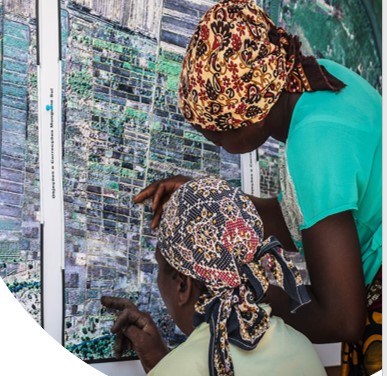Speeches Shim
Integrated Land and Resource Governance (ILRG) ![]() (pdf - 768k)
(pdf - 768k)
MOZAMBIQUE
In the 1990s, the government of Mozambique created a legal framework for land which recognized traditional community rights while encouraging investment. While the resulting legislation is progressive – land is owned by the state, and communities and good faith occupants have perpetual use rights – it has been unevenly implemented. The majority of rural residents are unaware of their communal and individual land rights, or, if aware, lack the political, financial, and technical means to effectively assert those rights in key situations. Many smallholders are unable to demarcate and register their land rights, limiting their ability to participate in programs, access credit, and defend their rights against third parties. The lack of reliable land records and cadastral maps exacerbates the situation, as the government allocates “empty” land that is actually being used or occupied by communities to investors. Both domestic and foreign investors are looking to invest in a more responsible manner, while communities are fighting to make sure that they can benefit from the investment that is streaming into the country.
LAND TENURE SUCCESS STORIES IN MOZAMBIQUE – USAID worked with Coca-Cola’s largest sugarcane supplier in Sub-Saharan Africa, Illovo Sugar, Ltd., in the area surrounding its 6,000-hectare sugarcane plantation in Mozambique. The partnership helped to build a better understanding at the community level of Mozambique’s land laws; map and record the land rights of smallholders; support participatory land use planning for members of a farmers’ cooperative; and create an open and accessible grievance mechanism for community members. In this context, the USAID Integrated Land and Resource Governance (ILRG) task order under the Strengthening Tenure and Resource Rights II (STARR II) IDIQ seeks to place tools for documenting and administering land rights in the hands of local communities; foster awareness and broader implementation of Mozambique’s legal framework for land; avoid or mitigate conflict arising from land disputes; and create an equitable environment for private and public investment.
ILRG Technical Assistance in MOZAMBIQUE
The ILRG team will provide methodologies, tools and technical backstopping to local communities and implementing partners to record their rights and negotiate with a range of state and non-state actors over land and resource use. ILRG will test these approaches across a range of agriculture, forestry, biodiversity, extractive sectors in diverse areas of the country. In each case, ILRG will document the experiences from these activities to provide policy makers, private sector actors, and the global community with evidence and lessons to feed into Mozambican policy and international best practices. In particular, ILRG will test technical and financial sustainability of models to document and administer rights through capacity-building of communities and civil society, as well as partnerships with land-based investors. Overall, these experiences aim to promote positive outcomes for communities and investors that result in improved land and resource management.
ILRG Program Information
Strong land and resource governance is important within the broader context of reaching many USAID goals. ILRG is a global USAID mechanism to support USAID Missions and Bureaus to assess and respond to land and resource tenure and property rights constraints within each country’s journey to self-reliance. The program is particularly focused on activities that: 1) carry out policy and legislative engagement; 2) pilot inclusive and gender-sensitive community and household rights documentation processes; 3) build capacity of a range of stakeholders; and 4) leverage private sector partnerships. To date, the program has been engaged in Mozambique, and in Zambia, Ghana, and India. The program runs from 2018 – 2021, with two additional option years.


Comment
Make a general inquiry or suggest an improvement.